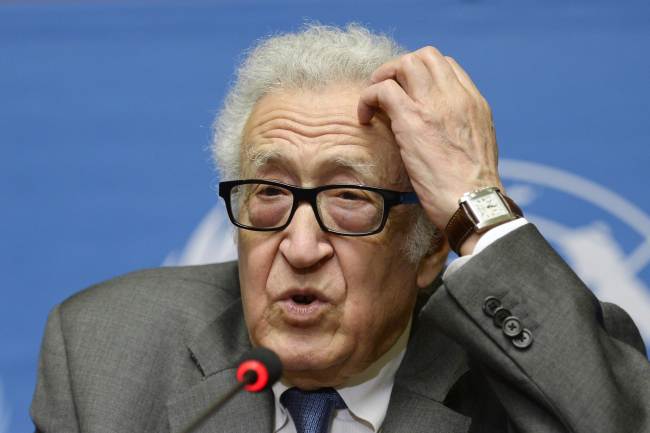
GENEVA (AP) ― In painstakingly choreographed encounters, Syria’s government and opposition faced each other for the first time Saturday, buffered by a U.N. mediator hoping to guide them to a resolution of the country’s devastating civil war.
The antagonists sat at the same table for nearly three hours, but didn’t address each other directly ― and by design avoided the contentious issue of who will lead the country. They entered through separate doors and, outside the walls of the United Nations, had little but criticism for each other.
No tangible progress was reported, but the mere fact the meeting was held represented what the mediator called a “half-step” toward peace. Unresolved was the fate of Homs, a city at the core of the uprising against President Bashar Assad that has been under siege for 20 months.
The mediator, Lakhdar Brahimi, said the peace conference would continue Sunday, focusing on humanitarian aid ― the one topic the Syrian government and the opposition could agree to discuss. Brahimi said if parallel negotiations succeeded within Syria, Homs could see an aid delivery by Monday.
“We haven’t achieved much, but we are continuing,” Brahimi said after about three hours spent seated midway between the two sides. “The situation is very difficult and very, very complicated, and we are moving not in steps, but half-steps.”
Sitting face to face at a U-shaped table and separated by Brahimi, Assad’s delegation and the Syrian National Coalition avoided directly touching on the war dividing them ― or discussing Assad himself. They spoke only to Brahimi, and not to each other.
“One is on the left and one on right and they face one another and they talk to each other ― through me, to one another,” he said. “This is what happens in civilized discussions ... I think it’s a good beginning.”
He said the government’s continuing practice of dropping bombs filled with crude explosives on civilian areas “hasn’t come under discussion.”
The peace conference intended to forge a path out of the civil war that has killed 130,000 people has been on the verge of collapse since it was first conceived 18 months ago. On Saturday, the talks avoided the main issue of Assad’s future, with both sides appearing to soften their approach after days of escalating rhetoric.
The coalition agreed to the Geneva talks only if the focus was on an end to the Assad dynasty, while the Damascus contingent zeroed in on fighting terrorism ― disputing any claims that it had agreed to the talks’ stated goal of a transitional government.
Louay Safi, of the coalition, described the talks as “consultations ― it’s not negotiations.”
“It wasn’t easy for us to sit with the delegation that represents the killers in Damascus, but we did it for the sake of the Syrian people and for the sake of the Syrian children,” said Anas al-Abdeh, who was among the coalition’s representatives. He said everyone remained calm during the first brief meeting at which only Brahimi spoke.
Diplomats have said even getting them to the same table can be considered an accomplishment.
First on the agenda was the proposed cease-fire in the city of Homs, Syria’s No. 3 city. Neighborhoods in the old city have been ravaged following repeated government assaults to reclaim control from rebels. The city had a pre-war population of 1 million, but most residents have since fled.
The city was one of the first areas that plunged into armed conflict in 2011 after Assad responded to largely peaceful protests by unleashing the military. A homegrown rebellion transformed into a regional proxy war between Iran and Saudi Arabia, with foreign fighters flooding in on both sides.
“Those who talk about ... Assad are talking about removing the man who is leading the war against terrorism,” Syrian Information Minister Omran al-Zoubi said just before the talks started.
-
Articles by Korea Herald


![[AtoZ into Korean mind] Humor in Korea: Navigating the line between what's funny and not](http://res.heraldm.com/phpwas/restmb_idxmake.php?idx=644&simg=/content/image/2024/04/22/20240422050642_0.jpg&u=)
![[Exclusive] Korean military set to ban iPhones over 'security' concerns](http://res.heraldm.com/phpwas/restmb_idxmake.php?idx=644&simg=/content/image/2024/04/23/20240423050599_0.jpg&u=20240423183955)



![[Graphic News] 77% of young Koreans still financially dependent](http://res.heraldm.com/phpwas/restmb_idxmake.php?idx=644&simg=/content/image/2024/04/22/20240422050762_0.gif&u=)
![[Herald Interview] Why Toss invited hackers to penetrate its system](http://res.heraldm.com/phpwas/restmb_idxmake.php?idx=644&simg=/content/image/2024/04/22/20240422050569_0.jpg&u=20240422150649)






![[Exclusive] Korean military to ban iPhones over security issues](http://res.heraldm.com/phpwas/restmb_idxmake.php?idx=652&simg=/content/image/2024/04/23/20240423050599_0.jpg&u=20240423183955)



![[Today’s K-pop] Ateez confirms US tour details](http://res.heraldm.com/phpwas/restmb_idxmake.php?idx=642&simg=/content/image/2024/04/23/20240423050700_0.jpg&u=)